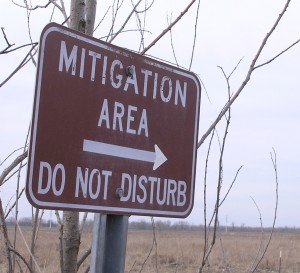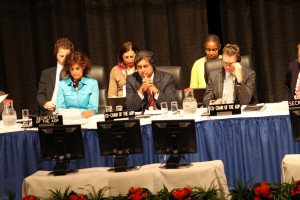In last week’s ADP negotiations, short-term mitigation efforts were the meal of the day.
While sometimes we can get pessimistic about UN climate negotiations, countries are taking some amazing strides towards decreasing their global emissions. In Europe, Finland has set new laws enforcing 80% reductions by 2050, Brazil has proved to the world the importance of preventing deforestation and Mexico has made some amazing strides in renewable energy.
However, what we need is a global goal to reduce emissions. As my fellow tracker Chris Wright reported, in the post-Kyoto world, we are still struggling to develop a global agreement that guarantees that the CO2 levels in the atmosphere are low enough to keep our planet – and the generations – alive.
After watching in on negotiations that cut into meal times, I decided to have a quick conversation with the Brazilian Delegation. They told me that everyone has to be very patient to follow these talks, especially if you believe that the future of the planet will be saved by ‘those guys in black suits from 195 different nationalities’.
As the ADP negotiations swept into the evening, matters of procedure seemed to dominate discussions, much more than any possible contribution or commitment from the countries. However, we can already see a clear polarization between some of the most vulnerable to climate change, like the small island countries in  the Pacific and the Caribbean, and the developed countries, like the United States and the European Union.
the Pacific and the Caribbean, and the developed countries, like the United States and the European Union.
Last year, during COP19, in Warsaw, it was agreed, as a path to the 2015 agreement, that in COP20 - which will happen this December, in Lima - countries will decide what are the elements of the new agreement, and the text itself would be discussed during 2015 to make sure we’re going to have a consensus at COP21, in Paris. There have been a few hiccups along the way here in Bonn, and ongoing confusion on this process.
Another approved topic was that each country should determine nationally what are going to be their contributions (in terms of reducing emissions) before COP21, by the end of 2015. The point here is that if we don’t have enough ambition to keep the CO2 levels in a safe stage, these contributions must be reviewed until the meeting in Paris.
Unfortunately, there were different views on today’s negotiations in regards to the deadlines associated with these contributions and assesments. There was also disagreement over whether these nationally determined contributions should or not become legally binding goals in the agreement or merely recommended parts of the process moving forward.
There are definite drivers and blockers of the process so far. The EU and the US have consistently blocked any chance of progression onto a draft negotiating text - something that may move the talks rapidly ahead, but also with great risk. While Egypt and the Philippines have been pushing to get some content to argue over.
That was when the Philippines and some others started to highlight the unsuccessful experiences the UNFCCC had in the past, like the Copenhagen 2012 failure.
Kuwait had a particularly unique participation, intervening firstly to say that it was really hard for non-native english speakers to understand expressions and acronyms used by many others in and finishe
d the meeting by saying that countries should “highlight good experiences that we had in the past instead of focusing their speeches in the ones that we failed”.
Thanks, distinguish Delegate of Kuwait; I feel the same way in both of your points!
After one day of resting, we moved from mitigation to economics and the discussions on finance efforts started today. Following the request of several countries in the last session, the chairs opened the floor by presenting in the screen some points that could guide the interventions. One of the convergence points they could reflect on the submissions made by countries and groups was the need to use the financial mechanisms of the Convention as the financial mechanism of the agreement, and not creating a new one. However, there is still a big divergence on who should be the contributions.
The Less-Developed Countries proposal to have finance commitments on the table and a review mechanism to ensure its adequacy before COP21.Bangladesh made strong a plea on innovative mechanisms called “auto-generating mechanisms”, mentioning bunker fuels and passenger levies. Zambia also called for innovative sources of finance and was supported by Norway. Despite the chairs’ opening presentation, that indicated pre-2020 finance as “already on its way” and asked countries to focus on post-2020/2015 agreement, the Philippines highlighted that pre-2020 and post-2020 are not separate issues.
 With prominent upright proposal, the African Group suggested that finance should fit under the contributions that each country will determine to the 2015 agreement, and Mexico called all countries, in a position to do so, to contribute to the Green Climate Fund. It is necessary for developed countries to commit to capitalize the Green Climate Fund on at least 15 billion dollars in grant. Developed countries proposed for public finance to be prioritized for adaptation and most vulnerable or less capable countries. By the end of the session, the most important result of these talkings was raised by Less-Developed Countries and AILAC – they’ve called for finance to be within the legally binding framework.
With prominent upright proposal, the African Group suggested that finance should fit under the contributions that each country will determine to the 2015 agreement, and Mexico called all countries, in a position to do so, to contribute to the Green Climate Fund. It is necessary for developed countries to commit to capitalize the Green Climate Fund on at least 15 billion dollars in grant. Developed countries proposed for public finance to be prioritized for adaptation and most vulnerable or less capable countries. By the end of the session, the most important result of these talkings was raised by Less-Developed Countries and AILAC – they’ve called for finance to be within the legally binding framework.
Unfortunately, as detailed on the article by my colleague Michalina, the Green Climate Fund is still sitting on a fragile USD 37 million, and we still have a lot to work on the commitments and contributions towards a global goal. We hope we can have some advance in the next days to hopefully highlight good experiences from this session, as requested last week by Kuwait’s negotiator.